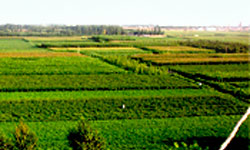Production of Nano Adsorbent to Measure Environmental Poisons
Iranian researchers from University of Mohaqqeq Ardebili succeeded in the measurement of fenitrothion in various samples of soil, water, plasma, etc. by producing hydrophobic nano adsorbents and reducing fenitrothion.
Fenitrothion is an insecticide and anti-rodent material which is widely used in farms and fields.

"Being aware of the difficulty in the measurement of organo-phosphorous poisons, we tried to present more suitable and cost-effective methods for this purpose," Dr. Habibollah Eskandari, one of the researcher, stated. "Therefore, the purpose of the study was to propose a simpler method with lower facility costs in order to measure very low amounts of fenitrothion. The method should have the necessary sensitivity and the required selectivity in order to measure fenitrothion in various samples."
According to Dr. Eskandari, the ratio of surface to volume has increased significantly in the particles due to the preparation and the implementation of polymeric adsorbent nano-spheres. In addition, the extraction and rinsing processes were carried out at the least possible time with higher performance.
Among the characteristics of the research, mention can be made of the addition of small amount of magnetite to the environment containing the magnetized polymer in order to overcome the low magnetization of the polymer. Moreover, the drying of the adsorbent phase collected after the extraction is among the other characteristics of the research. It minimizes the uncertainty in the rinsing phase volume in order to carry out the measurement, and it also prevents the repeated rinsing in order to separate the dye derivative component from the adsorbent phase.
Source: Nanotechnology Now
- 311 reads




